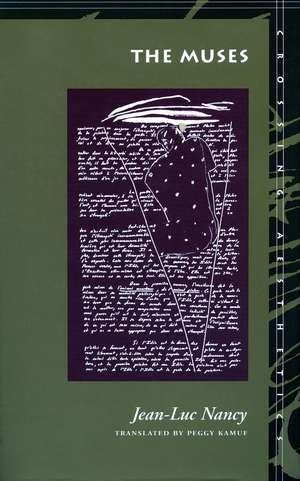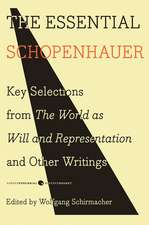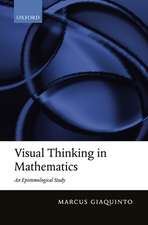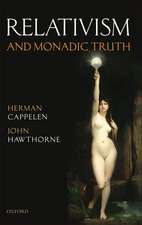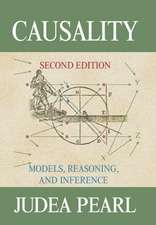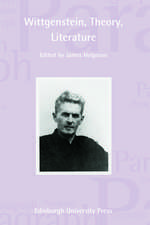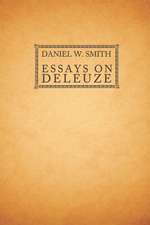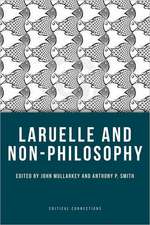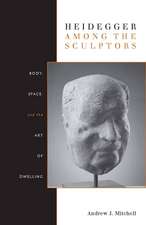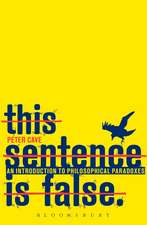The Muses: Meridian: Crossing Aesthetics
Autor Jean-Luc Nancy Traducere de Peggy Kamufen Limba Engleză Paperback – 28 feb 1997
This book, by one of the most challenging contemporary thinkers, begins with an essay that introduces the principal concern sustained in the four succeeding ones: Why are there several arts and not just one? This question focuses on the point of maximal tension between the philosophical tradition and contemporary thinking about the arts: the relation between the plurality of the human senses—to which the plurality of the arts has most frequently been referred—and sense or meaning in general.
Throughout the five essays, Nancy’s argument hinges on the culminating formulation of this relation in Hegel’s Aesthetics and The Phenomenology of Spirit—art as the sensible presentation of the Idea. Demonstrating once again his renowned ability as a reader of Hegel, Nancy scrupulously and generously restores Hegel’s historical argument concerning art as a thing of the past, as that which is negated by the dialectic of Spirit in the passage from aesthetic religion to revealed religion to philosophy.
Throughout the five essays, Nancy’s argument hinges on the culminating formulation of this relation in Hegel’s Aesthetics and The Phenomenology of Spirit—art as the sensible presentation of the Idea. Demonstrating once again his renowned ability as a reader of Hegel, Nancy scrupulously and generously restores Hegel’s historical argument concerning art as a thing of the past, as that which is negated by the dialectic of Spirit in the passage from aesthetic religion to revealed religion to philosophy.
| Toate formatele și edițiile | Preț | Express |
|---|---|---|
| Paperback (1) | 217.97 lei 6-8 săpt. | |
| Stanford University Press – 28 feb 1997 | 217.97 lei 6-8 săpt. | |
| Hardback (1) | 696.68 lei 6-8 săpt. | |
| Stanford University Press – 28 feb 1997 | 696.68 lei 6-8 săpt. |
Din seria Meridian: Crossing Aesthetics
-
 Preț: 78.35 lei
Preț: 78.35 lei -
 Preț: 227.94 lei
Preț: 227.94 lei -
 Preț: 232.81 lei
Preț: 232.81 lei -
 Preț: 226.40 lei
Preț: 226.40 lei -
 Preț: 164.45 lei
Preț: 164.45 lei -
 Preț: 271.73 lei
Preț: 271.73 lei -
 Preț: 249.82 lei
Preț: 249.82 lei -
 Preț: 279.44 lei
Preț: 279.44 lei -
 Preț: 199.10 lei
Preț: 199.10 lei -
 Preț: 258.64 lei
Preț: 258.64 lei -
 Preț: 149.49 lei
Preț: 149.49 lei -
 Preț: 231.67 lei
Preț: 231.67 lei -
 Preț: 142.73 lei
Preț: 142.73 lei -
 Preț: 172.13 lei
Preț: 172.13 lei -
 Preț: 146.40 lei
Preț: 146.40 lei -
 Preț: 139.64 lei
Preț: 139.64 lei -
 Preț: 228.39 lei
Preț: 228.39 lei -
 Preț: 138.82 lei
Preț: 138.82 lei -
 Preț: 227.71 lei
Preț: 227.71 lei -
 Preț: 148.45 lei
Preț: 148.45 lei -
 Preț: 127.27 lei
Preț: 127.27 lei -
 Preț: 224.41 lei
Preț: 224.41 lei -
 Preț: 139.42 lei
Preț: 139.42 lei -
 Preț: 210.00 lei
Preț: 210.00 lei -
 Preț: 203.47 lei
Preț: 203.47 lei -
 Preț: 154.20 lei
Preț: 154.20 lei -
 Preț: 159.75 lei
Preț: 159.75 lei -
 Preț: 224.41 lei
Preț: 224.41 lei -
 Preț: 149.68 lei
Preț: 149.68 lei -
 Preț: 196.44 lei
Preț: 196.44 lei -
 Preț: 210.00 lei
Preț: 210.00 lei -
 Preț: 111.58 lei
Preț: 111.58 lei -
 Preț: 168.96 lei
Preț: 168.96 lei -
 Preț: 250.69 lei
Preț: 250.69 lei -
 Preț: 172.95 lei
Preț: 172.95 lei -
 Preț: 138.60 lei
Preț: 138.60 lei -
 Preț: 147.22 lei
Preț: 147.22 lei -
 Preț: 150.72 lei
Preț: 150.72 lei -
 Preț: 141.28 lei
Preț: 141.28 lei -
 Preț: 216.48 lei
Preț: 216.48 lei -
 Preț: 252.92 lei
Preț: 252.92 lei -
 Preț: 191.39 lei
Preț: 191.39 lei -
 Preț: 227.27 lei
Preț: 227.27 lei -
 Preț: 169.42 lei
Preț: 169.42 lei -
 Preț: 147.85 lei
Preț: 147.85 lei -
 Preț: 204.32 lei
Preț: 204.32 lei -
 Preț: 150.72 lei
Preț: 150.72 lei -
 Preț: 207.82 lei
Preț: 207.82 lei -
 Preț: 162.67 lei
Preț: 162.67 lei
Preț: 217.97 lei
Nou
Puncte Express: 327
Preț estimativ în valută:
41.71€ • 43.39$ • 34.44£
41.71€ • 43.39$ • 34.44£
Carte tipărită la comandă
Livrare economică 15-29 aprilie
Preluare comenzi: 021 569.72.76
Specificații
ISBN-13: 9780804727815
ISBN-10: 0804727813
Pagini: 136
Dimensiuni: 152 x 229 x 15 mm
Greutate: 0.18 kg
Ediția:1
Editura: Stanford University Press
Colecția Stanford University Press
Seria Meridian: Crossing Aesthetics
ISBN-10: 0804727813
Pagini: 136
Dimensiuni: 152 x 229 x 15 mm
Greutate: 0.18 kg
Ediția:1
Editura: Stanford University Press
Colecția Stanford University Press
Seria Meridian: Crossing Aesthetics
Recenzii
“A truly exhilarating set of philosophical reflections on art and aesthetics. . . . Nancy masterfully explicates the threshold role art plays in the philosophical distinctions between the sensory and the sensible, life and death.”—Georges Van Den Abbeele, University of California, Davis
Notă biografică
Jean-Luc Nancy is Professor of Philosophy at the University of Strasbourg. Stanford has published two of his many books in English translation: The Birth to Presence and The Experience of Freedom (both 1993).
Textul de pe ultima copertă
“A truly exhilarating set of philosophical reflections on art and aesthetics. . . . Nancy masterfully explicates the threshold role art plays in the philosophical distinctions between the sensory and the sensible, life and death.”—Georges Van Den Abbeele, University of California, Davis
Descriere
"A truly exhilarating set of philosophical reflections on art and aesthetics. From the caves of Lascaux to Caravaggio's Death of the Virgin to the postmodern question of the marketplace and the 'end' of art, Nancy masterfully explicates the threshold role art plays in the philosophical distinctions between the sensory and the sensible, life and death, presentation and representation. Art is also compellingly shown to be the foundational category for any concept of religion, technology, or even 'humanity.'"
—Georges Van Den Abbeele, University of California, Davis
This book, by one of the most challenging contemporary thinkers, begins with an essay that introduces the principal concern sustained in the four succeeding ones: Why are there several arts and not just one? This question focuses on the point of maximal tension between the philosophical tradition and contemporary thinking about the arts: the relation between the plurality of the human senses—to which the plurality of the arts has most frequently been referred—and sense or meaning in general.
Throughout the five essays, Nancy's argument hinges on the culminating formulation of this relation in Hegel's Aesthetics and The Phenomenology of Spirit—art as the sensible presentation of the Idea. Demonstrating once again his renowned ability as a reader of Hegel, Nancy scrupulously and generously restores Hegel's historical argument concerning art as a thing of the past, as that which is negated by the dialectic of Spirit in the passage from aesthetic religion to revealed religion to philosophy.
In the book's second essay, Nancy reads what he calls Hegel's "secret" (a secret even from Hegel): the emergence of art as presentation rather than representation. This intricate and compelling reading is key to the remaining essays: a virtuoso reading of Caravaggio's Death of the Virgin; an analysis of a traced hand in the grotto of Lascaux as the essential mimetic gesture, the monstration of self outside of self; and an account of the contemporary situation of art, including the question whether art today is still art. Nancy is among the very few present-day thinkers who ask rigorous and sustained questions about art and the practice of thinking about art.
Meridian: Crossing Aesthetic
—Georges Van Den Abbeele, University of California, Davis
This book, by one of the most challenging contemporary thinkers, begins with an essay that introduces the principal concern sustained in the four succeeding ones: Why are there several arts and not just one? This question focuses on the point of maximal tension between the philosophical tradition and contemporary thinking about the arts: the relation between the plurality of the human senses—to which the plurality of the arts has most frequently been referred—and sense or meaning in general.
Throughout the five essays, Nancy's argument hinges on the culminating formulation of this relation in Hegel's Aesthetics and The Phenomenology of Spirit—art as the sensible presentation of the Idea. Demonstrating once again his renowned ability as a reader of Hegel, Nancy scrupulously and generously restores Hegel's historical argument concerning art as a thing of the past, as that which is negated by the dialectic of Spirit in the passage from aesthetic religion to revealed religion to philosophy.
In the book's second essay, Nancy reads what he calls Hegel's "secret" (a secret even from Hegel): the emergence of art as presentation rather than representation. This intricate and compelling reading is key to the remaining essays: a virtuoso reading of Caravaggio's Death of the Virgin; an analysis of a traced hand in the grotto of Lascaux as the essential mimetic gesture, the monstration of self outside of self; and an account of the contemporary situation of art, including the question whether art today is still art. Nancy is among the very few present-day thinkers who ask rigorous and sustained questions about art and the practice of thinking about art.
Meridian: Crossing Aesthetic
